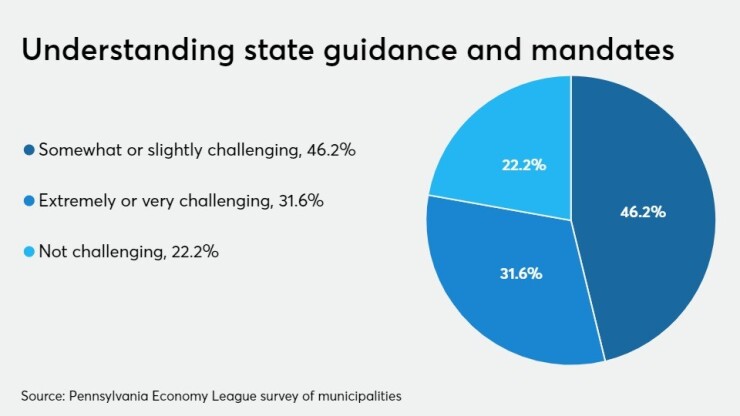The financial strain from COVID-19 has Pennsylvania’s cities and towns weighing a range of coping measures.
The crisis has also triggered inquiries about shared services and mergers.
“We’re being inundated with calls and requests for regionalization studies, from police mergers to fire services,” Kim Bracey, executive director for the state Department of Community and Economic Development’s Center for Local Government Services.
“Mergers aren’t for everyone, so we really have to figure out the costs involved, and then those that are positioned well to have such a thing, how best to reshepherd that along. We’re in the throes of several of them right now,” Bracey, a former York mayor, said on a Pennsylvania Economy League webcast.

A
PEL’s memberships include cities, boroughs, first- and second-class townships and home rule municipalities throughout the commonwealth.
Responses came from 430, or 17% of Pennsylvania’s 2,560 local governments surveyed from Aug. 1 to Sept. 15.
Among other findings, survey results showed that 23 municipalities expect to request admission into the Act 47 workout program for distressed communities, which DCED coordinates and now has 16 enrolled.
A further 38 communities said they are likely to apply to participate in DCED’s early-intervention Strategic Management Planning Program.
Notably, according to PEL, 21% of cities reported that they are issuing or may issue a tax anticipation note and 15% are delaying or may delay payment of their municipal pension obligation. Additional reported actions include borrowing from rainy-day funds and implementing hiring, wage and overtime freezes.
Turf mentalities and other traditions, plus cost uncertainties, have impeded progress on mergers.
“This is municipalities and in some sense communities giving up a sense of who they are,” said George Dougherty, an assistant professor at the University of Pittsburgh’s Graduate School for Public and International Policy.
“It does not necessarily lead to decreases in costs, in part because quality is always the issue that comes in. In particular, police departments, if they’re part time now, they’re not paying their officers benefits. We all know that when you add in the personnel benefits, those costs go up quite a bit.”
Dougherty, who has been an Act 47 coordinator for Braddock and Duquesne, both near Pittsburgh, suggested that cities and towns prepare two budget scenarios, including one for worst case.
“I do worry about the planning for municipal finances,” he said. “If this looks like 2009 in the recession, then municipalities are going to really struggle and those that are at the most risk are going to have some really tough decisions to make.”
Dougherty called on the commonwealth to provide greater flexibility to localities.

“Local governments right now are fairly well locked in to a limited set of resources, most of which have really hard caps. Boroughs can’t go above 30 mills. The earned income tax is very limited. The local services tax, which seemed like a lot of money 15 years ago when it was implemented, is still at $52 total, which if you add in inflation, is a lot less money now.”
David Black, president and chief executive of Harrisburg Regional Chamber and Capital Region Economic Development Corp., said businesses have learned to adjust during the crisis.
“I saw a lot of innovation. I saw a lot of folks adapting. We saw people moving from brewing beer to making hand sanitizer. We saw them moving from car parts to ventilators. It was remarkable what the Pennsylvania business community did.”
Adjusting, Black said, included understanding government directives during a highly fluid situation in the early months.
“It kind of goes back to what businesses usually ask … ‘OK, tell me what the rules are. I’ll follow them, but I’ve got to understand what they are first.’ ”





